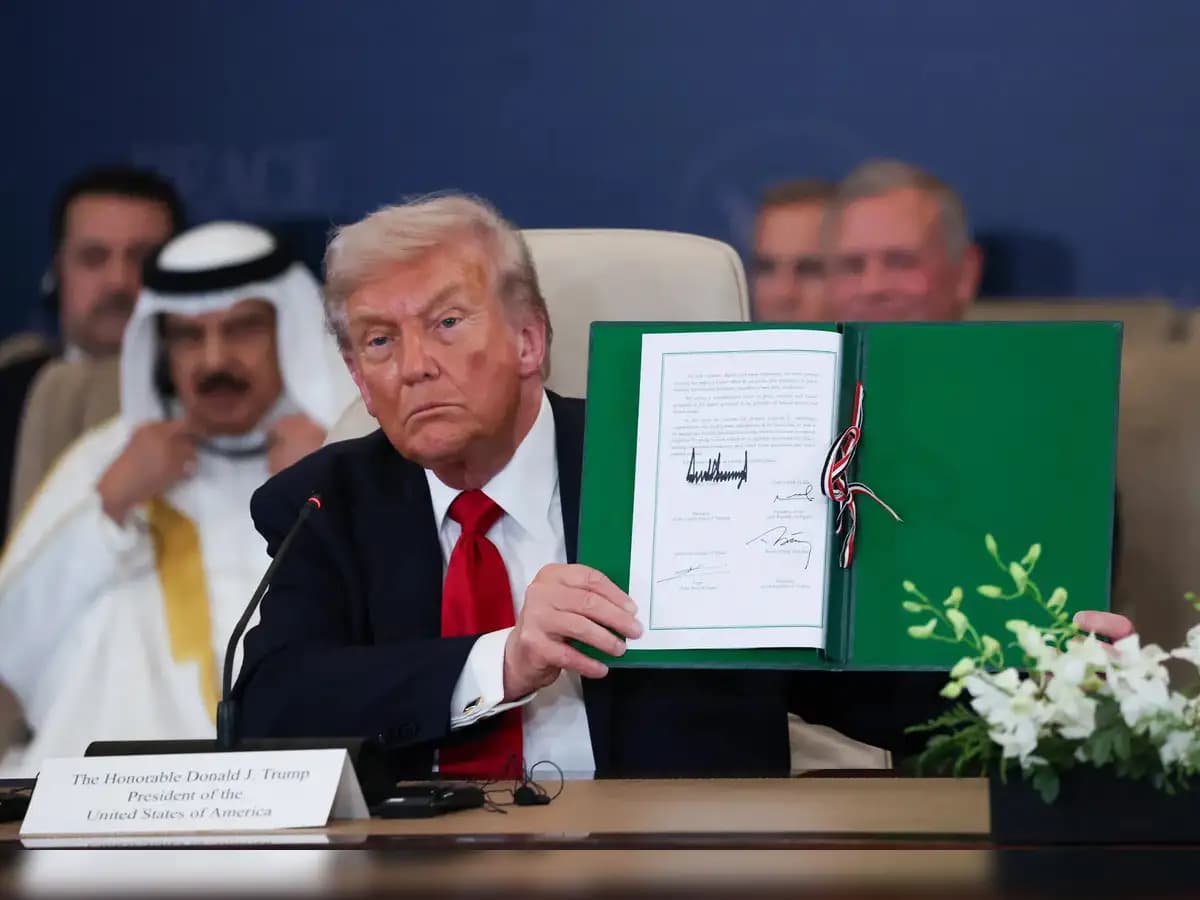We're loading the full news article for you. This includes the article content, images, author information, and related articles.
Former US President Donald Trump has declared a "historic dawn of a new Middle East" following a ceasefire in Gaza and the release of Israeli hostages, signalling a potential shift towards broader regional cooperation, including with Iran.

US President Donald Trump, addressing the Israeli Knesset on Monday, October 13, 2025, proclaimed the end of the "long and painful nightmare" of the Gaza war. His speech came hours after the last remaining Israeli hostages were released from Gaza, a key component of a US-brokered peace plan. Trump asserted that Israel had achieved "all that it can by force of arms" and called for a new era of cooperation in the Middle East, potentially extending to peace with Iran.
The President's remarks were delivered during a visit to Israel, where he was received with acclaim. He then travelled to Sharm el-Sheikh, Egypt, to co-host a summit with Egyptian President Abdel Fattah al-Sisi, attended by over 20 world leaders. The summit aimed to endorse Trump's peace plan, initiate the reconstruction of Gaza, and establish a limited form of Palestinian self-rule.
The relationship between Israel and Iran has undergone a dramatic transformation over the decades. From the 1940s to the late 1970s, under the Shah's monarchy, Iran and Israel maintained surprisingly friendly ties. Iran was the second Muslim-majority country, after Turkey, to recognise the State of Israel in 1950.
This cooperative relationship included strong official and trade ties, military collaboration, and even joint operation of an oil pipeline. However, the 1979 Islamic Revolution in Iran fundamentally altered this dynamic, leading to the severing of all official ties and the adoption of a fiercely anti-Israel stance by the new regime. Since the early 1990s, the relationship has been characterised by open hostility and a proxy conflict across the Middle East.
The recent Gaza war commenced on Saturday, October 7, 2023, with a surprise attack by Hamas on Israel. This initiated a conflict that has seen multiple phases, including an Israeli invasion of the Gaza Strip and several attempts at ceasefires. The current ceasefire, which came into effect on Thursday, October 10, 2025, is part of a US-backed peace plan.
Key provisions of this initial phase include the release of Israeli hostages in exchange for Palestinian prisoners and detainees, the withdrawal of Israeli forces to a pre-approved line, and the facilitation of humanitarian aid into Gaza. Reports indicate that all 20 remaining living Israeli hostages were freed, and approximately 1,700 Palestinian detainees and 250 prisoners serving life sentences were released by Israel.
Kenya has been closely monitoring the developments in the Middle East, recognising the potential economic and security ramifications for the East African nation. The conflict has raised concerns about disruptions to oil supplies and potential hikes in fuel prices, which have already been at unprecedented highs in Kenya.
Furthermore, heightened security risks in the Middle East could lead to travel advisories, negatively impacting Kenya's vital tourism industry. While Kenya maintains diplomatic relations with both Israel and Palestine, its foreign policy has historically leaned towards the West and, by extension, has been largely pro-Israel. Kenya has also seen increased trade with Iran in recent years.
Nairobi has welcomed the ceasefire, describing it as a "vital step in easing human suffering in Gaza" and urging all parties to build towards a lasting peace based on a two-state solution, as outlined in UN resolutions. Kenya's engagement in counterterrorism operations with Western allies also positions it as a potential target for radical groups, underscoring the need for vigilance against ideological spillover from the Middle East conflict.
Despite the recent breakthroughs, significant uncertainties remain regarding the long-term stability of the region. The subsequent phases of the peace plan will need to address complex issues such as Gaza's post-war governance, Israel's demand for Hamas to disarm, and Palestinian aspirations for statehood. Hamas has reportedly rejected disarmament, and the current Israeli government has opposed Palestinian statehood.
The role of a proposed stabilisation force in Gaza, comprising US troops and deployments from Arab and Muslim-majority nations, also requires further clarity. The commitment of all stakeholders to these challenging aspects will be crucial for translating the current ceasefire into a durable peace. Kenya, like other nations, will be watching closely to see how these critical issues are navigated in the coming months.
Keep the conversation in one place—threads here stay linked to the story and in the forums.
Sign in to start a discussion
Start a conversation about this story and keep it linked here.
Other hot threads
E-sports and Gaming Community in Kenya
Active 9 months ago
The Role of Technology in Modern Agriculture (AgriTech)
Active 9 months ago
Popular Recreational Activities Across Counties
Active 9 months ago
Investing in Youth Sports Development Programs
Active 9 months ago